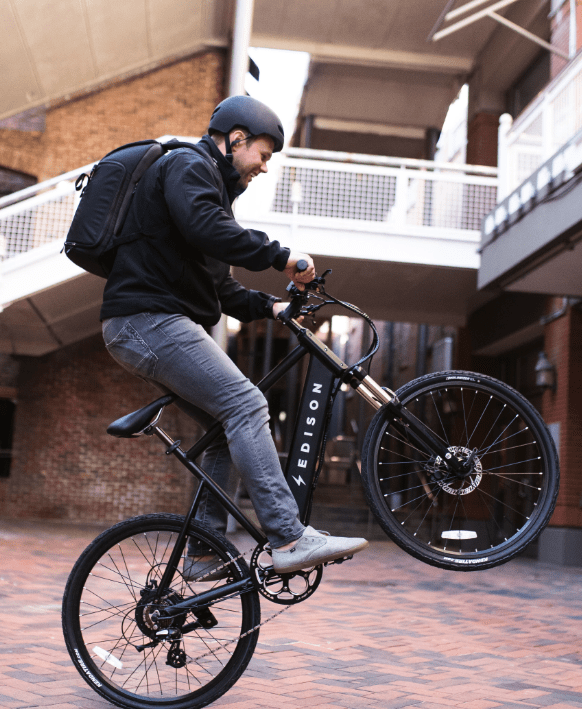How eBike Company Edison Bicycles Is Rethinking Urban Mobility—One Local Ride at a Time
Edison Bicycles founder, Ryan Hersh, poppin’ a wheelie on his Edison eBike.
Building the Last E-Bike You’ll Ever Buy
If you’ve lived in Atlanta long enough, you’ve probably seen one of Edison Bicycles’ sleek electric bikes zipping through town. You may not have realized just how many there are—over 5,000 Edison V2s are already on the road in Metro Atlanta alone. And if you ask Edison’s founder, Ryan Johnson, that’s just the beginning of what’s possible.
“We still have a lot of work to do,” Ryan says. “But if just 5% of Atlanta chose to replace some of their car trips with a bike, the difference in traffic, air quality, and quality of life would be massive.”
This month, we sat down with Ryan to talk about e-bikes, Edison’s local roots, and what it means to build a truly sustainable transportation brand.
Why People Buy E-Bikes
While e-bikes can be used for fitness or fun, Ryan says the majority of Edison’s customers have one goal: cutting down their commute.
“9 times out of 10, people are buying our bikes for commuting,” he explains. “E-bikes are the best way to dart about the city—cutting trip times, removing parking woes, and reducing traffic congestion.”
And that’s no small thing in a city like Atlanta, where the average commuter spends over 260 hours in traffic every year.
Why Choose Edison?
There are plenty of e-bike options online, but Edison has carved out a loyal base of Atlanta riders for one big reason: they’re local.
“Bikes are machines with a lot of moving parts. Things break. When you buy from a big-box company, you will encounter service delays,” Ryan says. “Because we build our bikes right here, we have intimate knowledge of how to service them and we’re never waiting on parts.”
Every Edison comes with free local servicing and lifetime maintenance at their Atlanta location, which means customers can keep their bikes in top condition—an essential part of maximizing environmental benefit.
The Big Wins (and Challenges) in E-Bike Sustainability
According to Ryan, the biggest win in the e-bike industry so far isn’t just the emissions reductions—it’s a broader shift away from car dependency.
“Beyond reducing emissions, e-bikes ease congestion, cut down on fuel, and promote a healthier lifestyle. They save people money and make cities more livable,” he says.
But the challenge? Mainstream adoption. As Ryan puts it, “We need to move beyond the tech-savvy early adopters and make e-bikes feel practical and accessible to everyone. That takes education.”
Edison’s Approach to Sustainability
Edison’s sustainability efforts start in the shop. They recycle everything from cardboard and foam to used bike parts, working with local co-ops and centers like CHaRM (Center for Hard to Recycle Materials). They even harvest good battery cells from old packs and donate them to electronics refurbishers.
“We don’t throw anything away if it can be reused,” Ryan says.
Importantly, these practices don’t raise prices for customers. “While it takes time and there are costs involved, we see this as the cost of doing business,” he explains. “It’s not factored into the price of our bikes because we want our bikes to be a practical car replacement—affordable, reliable, and serviceable.”
What’s Next: A Modular, Future-Proof E-Bike
Edison’s 2025 goal is simple but ambitious: Build the last e-bike you’ll ever need to buy.
The company is set to launch a new lineup of bikes this spring that are even more serviceable, upgradeable, and long-lasting than the popular V2 model.
“These new bikes will be more powerful, have longer range, and most importantly, they’re built to last,” says Ryan. “Every component is being standardized so you can upgrade and repair your bike for years to come.”
In an industry often focused on faster, newer, flashier tech, Edison is taking a longer view.
Final Thoughts
“If you care about Atlanta, about clean air, about livable streets, this is one of the best ways to help,” Ryan says. “Join our family. Be a part of the solution.”
Edison’s commitment to sustainability goes beyond buzzwords—it’s built into their business model, their bikes, and their belief that transportation doesn’t have to cost the planet.








